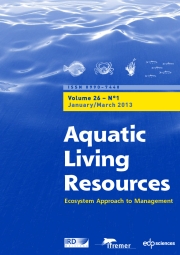Crossref Citations
This article has been cited by the following publications. This list is generated based on data provided by
Crossref.
KAUSHIK, S
1998.
Nutritional bioenergetics and estimation of waste production in non-salmonids.
Aquatic Living Resources,
Vol. 11,
Issue. 4,
p.
211.
Mullaney, Edward J.
Daly, Catherine B.
and
Ullah, Abul H.J.
2000.
Vol. 47,
Issue. ,
p.
157.
Barrias, C.
and
Oliva-Teles, A.
2000.
The use of locally produced fish meal and other dietary manipulations in practical diets for rainbow trout Oncorhynchus mykiss
(Walbaum).
Aquaculture Research,
Vol. 31,
Issue. 2,
p.
213.
Pimentel-Rodrigues, A M
and
Oliva-Teles, A
2001.
Phosphorus requirements of gilthead sea bream (Sparus aurata
L.) juveniles.
Aquaculture Research,
Vol. 32,
Issue. ,
p.
157.
Jobling, Malcolm
Gomes, Emidio
and
Dias, Jorges
2001.
Food Intake in Fish.
p.
25.
Papatryphon
and
Soares
2001.
The effect of phytase on apparent digestibility of four practical plant feedstuffs fed to striped bass, Morone saxatilis
.
Aquaculture Nutrition,
Vol. 7,
Issue. 3,
p.
161.
Cho, C Y
and
Bureau, D P
2001.
A review of diet formulation strategies and feeding systems to reduce excretory and feed wastes in aquaculture.
Aquaculture Research,
Vol. 32,
Issue. ,
p.
349.
Vielma, Jouni
Ruohonen, Kari
and
Peisker, Manfred
2002.
Dephytinization of two soy proteins increases phosphorus and protein utilization by rainbow trout, Oncorhynchus mykiss.
Aquaculture,
Vol. 204,
Issue. 1-2,
p.
145.
Cheng, Zongjia J
and
Hardy, Ronald W
2003.
Effects of extrusion and expelling processing, and microbial phytase supplementation on apparent digestibility coefficients of nutrients in full-fat soybeans for rainbow trout (Oncorhynchus mykiss).
Aquaculture,
Vol. 218,
Issue. 1-4,
p.
501.
Sajjadi, M.
and
Carter, C.G.
2004.
Effect of phytic acid and phytase on feed intake, growth, digestibility and trypsin activity in Atlantic salmon (Salmo salar, L.).
Aquaculture Nutrition,
Vol. 10,
Issue. 2,
p.
135.
Vielma, Jouni
Ruohonen, Kari
Gabaudan, Jacques
and
Vogel, Kurt
2004.
Top-spraying soybean meal-based diets with phytase improves protein and mineral digestibilities but not lysine utilization in rainbow trout, Oncorhynchus mykiss (Walbaum).
Aquaculture Research,
Vol. 35,
Issue. 10,
p.
955.
Sajjadi, M.
and
Carter, C.G.
2004.
Dietary phytase supplementation and the utilisation of phosphorus by Atlantic salmon (Salmo salar L.) fed a canola-meal-based diet.
Aquaculture,
Vol. 240,
Issue. 1-4,
p.
417.
Oliva-Teles, Aires
and
Pimentel-Rodrigues, Ana
2004.
Phosphorus requirement of European sea bass (Dicentrarchus labrax L.) juveniles.
Aquaculture Research,
Vol. 35,
Issue. 7,
p.
636.
Kaushik, S.J.
Covès, D.
Dutto, G.
and
Blanc, D.
2004.
Almost total replacement of fish meal by plant protein sources in the diet of a marine teleost, the European seabass, Dicentrarchus labrax.
Aquaculture,
Vol. 230,
Issue. 1-4,
p.
391.
Jobling, M.
2004.
Culture of Cold‐Water Marine Fish.
p.
363.
El-Shafai, Saber A
El-Gohary, Fatma A
Verreth, Johan A J
Schrama, Johan W
and
Gijzen, Huub J
2004.
Apparent digestibility coefficient of duckweed (Lemna minor), fresh and dry for Nile tilapia (Oreochromis niloticus L.).
Aquaculture Research,
Vol. 35,
Issue. 6,
p.
574.
Schneider, O.
Sereti, V.
Eding, E.H.
and
Verreth, J.A.J.
2005.
Analysis of nutrient flows in integrated intensive aquaculture systems.
Aquacultural Engineering,
Vol. 32,
Issue. 3-4,
p.
379.
Debnath, Dipesh
Pal, Asim K
Sahu, Narottam P
Jain, Kamal K
Yengkokpam, Sona
and
Mukherjee, Subhas C
2005.
Effect of dietary microbial phytase supplementation on growth and nutrient digestibility of Pangasius pangasius (Hamilton) fingerlings.
Aquaculture Research,
Vol. 36,
Issue. 2,
p.
180.
Waagbø, R.
2006.
Biology of Nutrition in Growing Animals.
Vol. 4,
Issue. ,
p.
387.
Zhang, Chunxiao
Mai, Kangsen
Ai, Qinghui
Zhang, Wenbing
Duan, Qingyuan
Tan, Beiping
Ma, Hongming
Xu, Wei
Liufu, Zhiguo
and
Wang, Xiaojie
2006.
Dietary phosphorus requirement of juvenile Japanese seabass, Lateolabrax japonicus.
Aquaculture,
Vol. 255,
Issue. 1-4,
p.
201.


